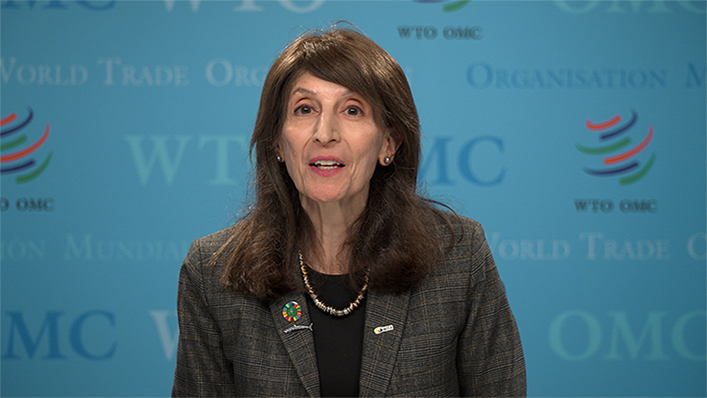
DDG Ellard began by discussing the WTO’s main functions: negotiations, trade monitoring, and dispute settlement. She also highlighted the importance of the technical assistance provided to developing members and least-developed country (LDC) members. Despite the rise of regional trade agreements, she noted that approximately 75% of global trade still operates under WTO rules. She emphasized the consensus-based nature of decision-making at the WTO, which ensures that all members, regardless of size or wealth, have an equal voice.
DDG Ellard then outlined the Organization’s current negotiating priorities. First, she stressed the importance of bringing into force the Agreement on Fisheries Subsidies, adopted in June 2022, to end the worst form of fisheries subsidies. To do this, 111 WTO members — two-thirds of the WTO membership — must accept the Agreement; currently, 83 have done so, leaving 28 remaining for entry into force. She also highlighted the ongoing negotiations on the second part of the Agreement, which aims to address overcapacity and overfishing. “Maintaining momentum, especially at senior levels, is crucial for achieving the political will needed to conclude these negotiations,” she stated. She further underscored the need to find a way to incorporate plurilateral efforts of WTO members, namely the Investment Facilitation for Development Agreement and outcomes of the Joint Statement Initiative on E-commerce, into the WTO rulebook.
DDG Ellard also discussed the vital role of committees in monitoring the implementation of WTO agreements. “Transparency and notifications are essential to our work — they are the glue that binds compliance and accountability,” she explained. She emphasized the importance of the Sanitary and Phytosanitary (SPS) and Technical Barriers to Trade (TBT) committees in addressing specific trade concerns, noting that only a small fraction of these concerns escalates into formal disputes. She also highlighted the ePing platform, which provides easy access to notifications and specific trade concerns raised in the SPS and TBT committees, accessible to both governments and the private sector.
Regarding dispute settlement, DDG Ellard commended the efforts of Ambassador Usha Dwarka-Canabady of Mauritius and the six co-facilitators on dispute settlement reform in assisting in the ongoing negotiations among WTO members to deliver a fully and well-functioning system by 2024, as mandated by ministers at the 12th and 13th Ministerial Conferences. DDG Ellard noted that although the Appellate Body is currently non-operational, the dispute settlement system still functions, as members continue to bring disputes to the WTO, with seven new cases initiated this year and seven panel proceedings ongoing.
In discussing broader WTO reform, DDG Ellard acknowledged that while all members agree on the need for reform, their priorities differ. She outlined three main areas of focus: (i) reforming substantive rules through negotiations; (ii) improving the deliberative function related to how business is conducted within committees, councils, and other bodies; and (iii) enhancing the Secretariat’s support for WTO members.
In conclusion, DDG Ellard emphasized the WTO’s vital role as a forum for members to engage across geopolitical fault lines and navigate complex trade issues collaboratively to avoid fragmentation. Pointing to the millions who have been lifted out of poverty since the WTO was created, she highlighted that this approach not only strengthens the multilateral trading system but also contributes to greater global stability and sharing the benefits of trade.
Share
Reach us to explore global export and import deals